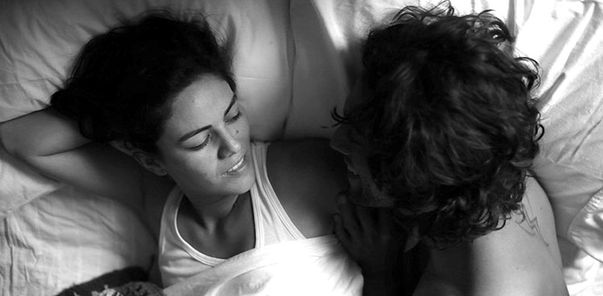Viaje
by Andra Petrescu

Viaje, the second feature of young director Paz Fábrega, starts as a cute boy meets girl/road trip film with two characters, all shot beautifully in black and white as to suggest from the beginning that this is not a mainstream romance genre.
Luciana and Pedro meet at a party and leave together for a simple and unattached one night stand, and as they discuss this on the way to his house, they are committed not to commit like their friends who married, had children and changed into different persons. They are gullible, young and beautiful, and as the narrative progresses, nothing from the real world seems to trouble them. They meet, they like each other, they seem to have good sexual chemistry and so she goes with him for a few days to Rincón de la Vieja National Park, where he does work as a biologist. The film unfolds with beautiful and conventional erotic imagery amongst nature, though it keeps away from actually being lascivious. They obviously like each other, but she is unsure whether to stay or leave; she doesn't seem willing to give up her lifestyle, nor her freedom.
It's a modern fairy tale with gender roles overlapping and patriarchal stereotypes contradicted. However progressive the film is in its intentions, there is a conflict between having a supposedly feminist main character and actually representing a female character through the same lenses of more traditional love stories. It is disappointing that the narrative encourages the viewer to wish for her to stay because it doesn't allow space for her feelings and at the same time it sends the message that that would be wrong. It would ruin the perfect escapist love story that we were invited to. The reason this happens is because of the way their relationship is presented: a fantasy of what conjugal happiness is supposed to be. It is not so much a sexual fantasy, but Paz Fábrega does very much use eroticism as a way of making the viewer both immersed, and empathize with the story.
In terms of characters, there's a problem with how Luciana never reveals herself to the spectator more than she does to Pedro. It clearly mimics her indisposition to stay still for long, but for a story that already announced this from its first lines, it becomes tiresome, not to say that it also poorly rhymes with a Kodak moment of the two lovers sensually touching a mimosa pudica. And as it is, it shows her more afraid than liberal.
Constructing a real progressive story requires more than shaky characters; they should be intelligent and complicated enough to make the equality between them work. Viaje is a nice romance story that fails to be honest in its intent, playing on conventional romantic mechanics, never contradicting them, but neither accepting them. It remains stuck somewhere in the middle, and though it may be visually beautiful and at times captivating, it is disappointing.

